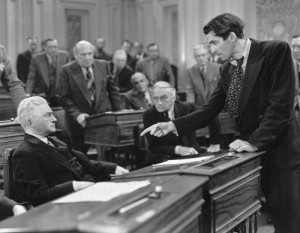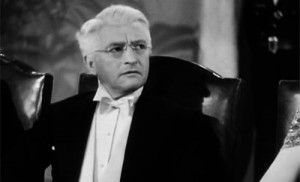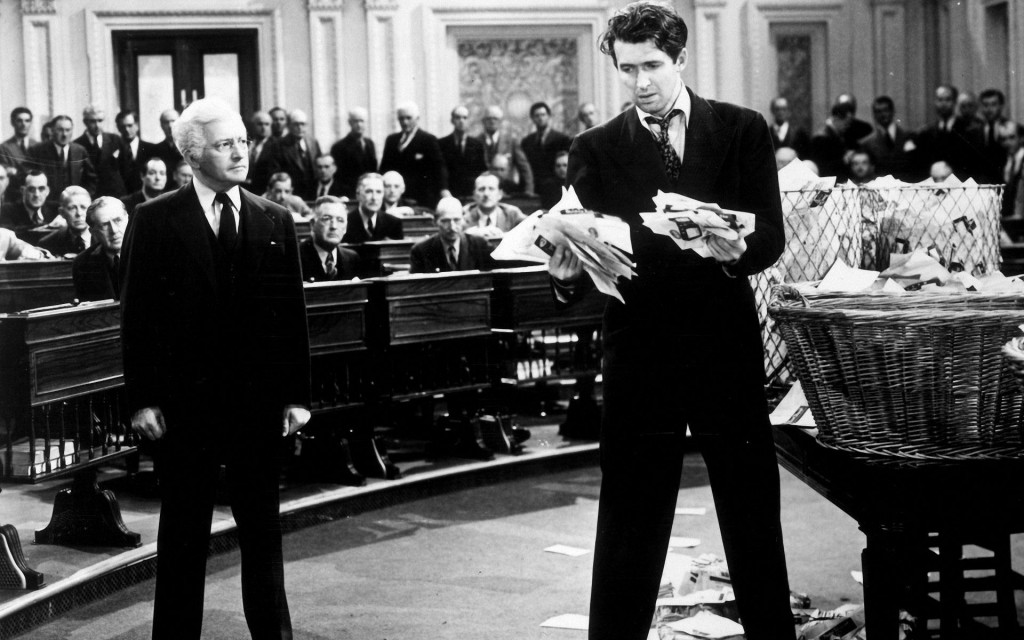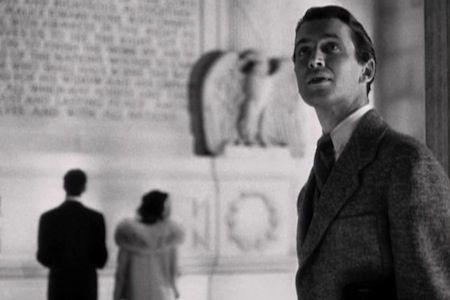There were a number of things about Wednesday’s Capra-esque spectacle that bothered me. But the one that I couldn’t get out of my mind no matter what? The one that compelled me to break one of my cardinal blogging rules: “Thou Shalt Not Write On Politics, Lest Your Ignorance Be Laid Bare Before the Entire World?”
It isn’t that we lack for Stewarts — we’ve always had Quixotes, and always will (thank God) — it’s that we have no Claude Rainses.
 In Mister Smith Goes to Washington, Rains plays Senator Joseph Harrison Paine, senior senator from an unnamed Western state, who owes his powerful political position to a shadowy and corrupt political mastermind, Jim Taylor. The state’s newly-minted junior senator, Jefferson Smith (Stewart), considers Paine an ally in his reform efforts, and Paine allows him to labor under that misconception as long as it serves his purposes. But when his attempts to further Taylor’s agenda are thwarted by Smith’s dewy-eyed patriotism, the gloves come off. Using every political tool at his sizable disposal, Paine strives to break Smith’s spirit. But when Smith gamely filibusters one of Paine’s more nefarious schemes, Paine is moved in spite of himself, gradually succumbing to the angels of his better nature.
In Mister Smith Goes to Washington, Rains plays Senator Joseph Harrison Paine, senior senator from an unnamed Western state, who owes his powerful political position to a shadowy and corrupt political mastermind, Jim Taylor. The state’s newly-minted junior senator, Jefferson Smith (Stewart), considers Paine an ally in his reform efforts, and Paine allows him to labor under that misconception as long as it serves his purposes. But when his attempts to further Taylor’s agenda are thwarted by Smith’s dewy-eyed patriotism, the gloves come off. Using every political tool at his sizable disposal, Paine strives to break Smith’s spirit. But when Smith gamely filibusters one of Paine’s more nefarious schemes, Paine is moved in spite of himself, gradually succumbing to the angels of his better nature.
Capra offers Paine’s capitulation as a sign that patriotism and Truth can win out in the end. If such self-examination, self-recrimination, and eventual conversion is possible for someone as habitually crooked as Paine, then the idealistic naiveté of Smith’s filibuster makes perfect sense. Speaking Truth to Power is easy if you believe that the Truth has Power. In a “Might Makes Right” system, however — where Power is Truth rather than the other way ’round — a lone man standing up against powerful opponents is far less hopeful. “Keep telling it like it is ’til someone pays attention” is only an effective political tool if the opposition is actually interested in listening, or if it is compelled to do so. And if yesterday is any indication, Senator Rand Paul’s opponents (on both sides of the aisle) were profoundly disinterested.
Some will argue that Senator Paul’s successful(?) efforts to wring some assurances from the President and Eric Holder justifies his tactics, just as some will argue that his filibuster was nothing more than self-centered and meaningless political theater. Either way, the bipartisan lack of interest and attention this week was simply “business as usual.”
And it shouldn’t be.
When contrasting Capra’s fictional world with the one we currently occupy, the thing that struck me most was that Paine listened — listened even though it was his opponent’s harangue, and not his own; and listened even though he didn’t want to. And through that listening, he was reminded of his respect (even reverence) for the customs and principles of his country’s governance, recognizing once again that the position he held was not only an important and powerful one, but one that brought with it certain obligations.
You don’t have to agree with your opponent; you don’t even have to like him. But you should pay him the courtesy of listening when he’s talking. It might do both of you a great deal of good.
Setting aside the particulars of yesterday’s “debate” for a moment — as well as the suggestion that filibusters have largely become procedural and political tools rather than principled ones — I find myself far more interested in the response to Paul’s speechifying, and the behaviors and attitudes that response manifests to “outsiders/constituents” such as me: we live in a political environment where our Majority Leader can stand up and say (essentially), “Wait. You still talkin’? Yeesh! Let’s grab a bite, guys, and come back tomorrow. ”
Is this a new political climate? I don’t know. And frankly, I don’t care. It’s a poisonous one, regardless of its lifespan or origins.
Yes, I realize that this kind of thing that has been “going on for years,” that it’s “customary,” and that this is “how our government works.” And I’m not really interested in picking on Harry Reid per se. But the empty seats that I see whenever I flip past CSPAN are deeply unsettling to me. It was “empty chair” rhetoric that led to Eastwood’s canonization/crucifixion last year, but take a look at that clip from earlier this week. That’s where the real empty chairs are. No one’s even paying attention.
The fact that our senators are so cavalier and nonchalant when it comes to listening to one another strikes me as both counterproductive and profoundly indicative of the problems we face. Things are so predetermined that the public presentation of one’s ideas and positions is seen as meaningless in the majority of cases, and the chance of seeing real conversation and debate on the Senate floor is about as likely as the chance of seeing a Presidential Debate that answers questions instead of spouting sound bites.
 Suggesting that we can (or should) find common ground on all topics is absurd; there will always be legitimate and insurmountable disagreement. But dismissing one’s opponents because you realize that you have the requisite power to achieve your goals — “We’ve got the votes!” — is a corrosive mentality, striking at the heart of any honest debate or genuine compromise. We don’t need a modern-day Jim Taylor to bully and bluster and throw his weight around; we’ve got an entire Senate-full of Jim Taylors already.
Suggesting that we can (or should) find common ground on all topics is absurd; there will always be legitimate and insurmountable disagreement. But dismissing one’s opponents because you realize that you have the requisite power to achieve your goals — “We’ve got the votes!” — is a corrosive mentality, striking at the heart of any honest debate or genuine compromise. We don’t need a modern-day Jim Taylor to bully and bluster and throw his weight around; we’ve got an entire Senate-full of Jim Taylors already.
The machinations of the American political behemoth are opaque to me, so this response is an admittedly emotional one. But yesterday’s events (and others like it) remind me of Benedict XVI’s suggestion that a relativistic culture will focus on questions of power and expediency rather than those of right and wrong. Our leaders are increasingly disinterested in giving Jefferson Smith and his kind a platform — and even less interested in listening to them use it — because they’re often far less interested in whether or not they should do something than in whether or not they can.
Maybe if they listened more and flexed their political muscles less, they’d discover themselves, Paine-like, remembering who it is that put them in that august chamber in the first place.
And maybe, just maybe, they’ll start to remember why they’re there.














